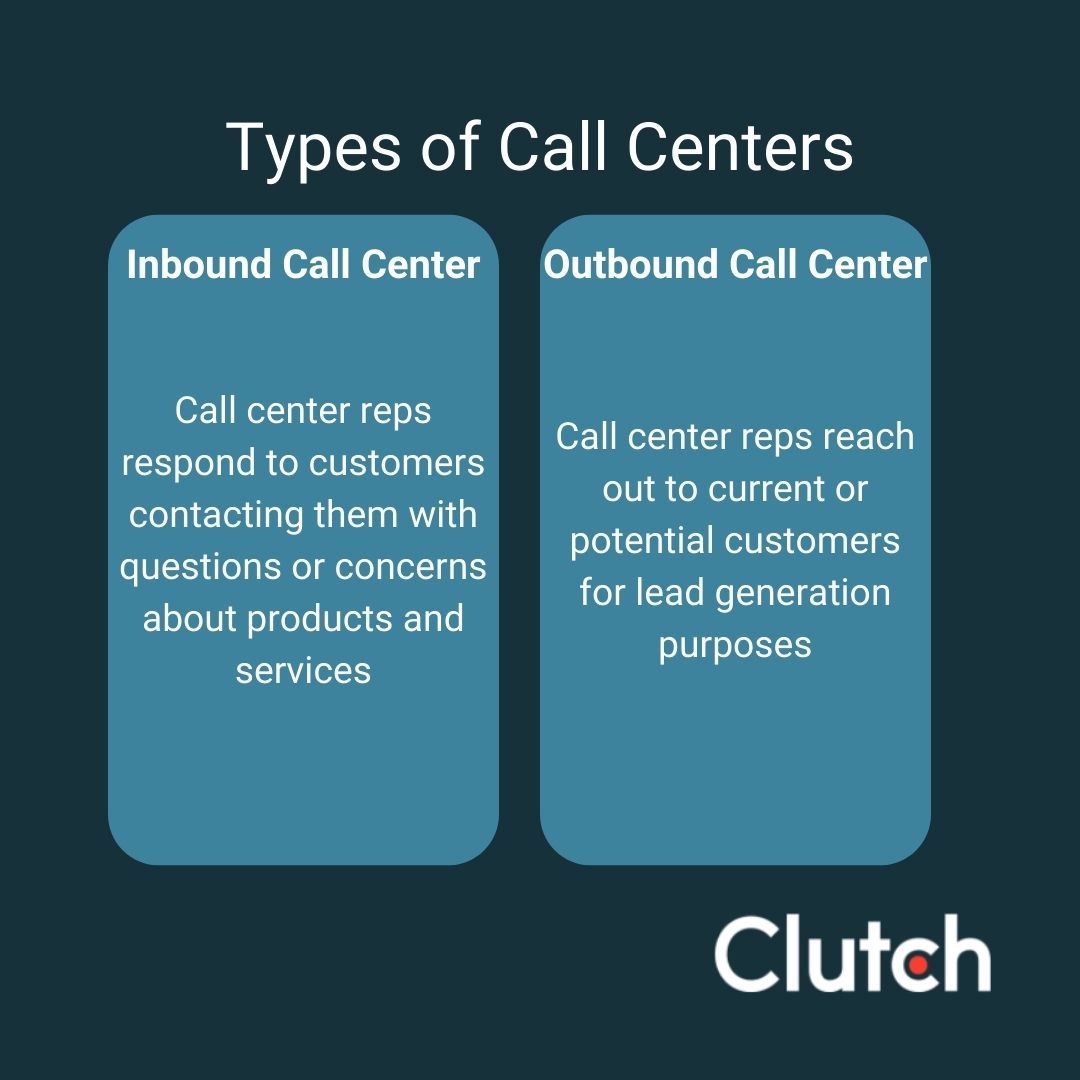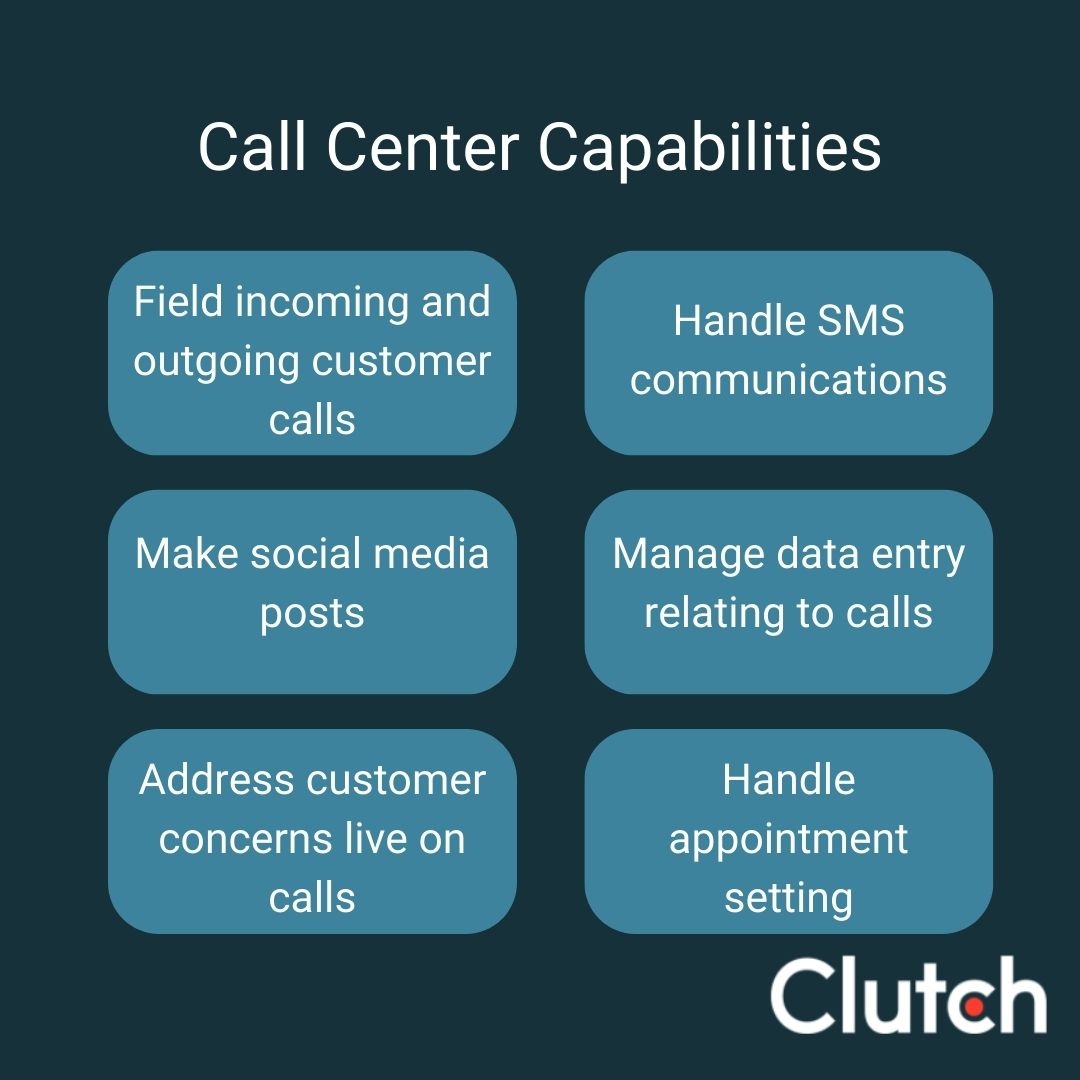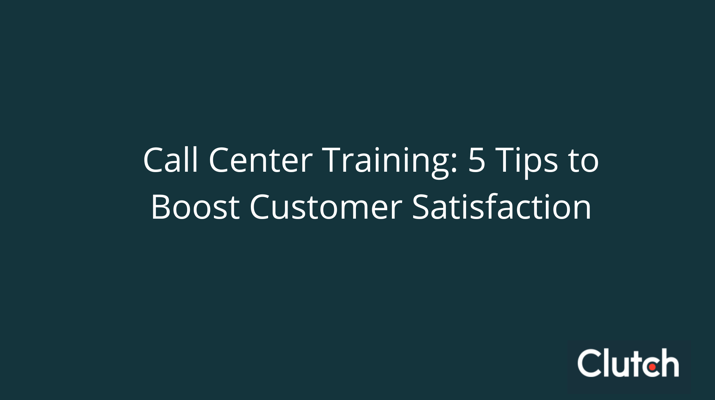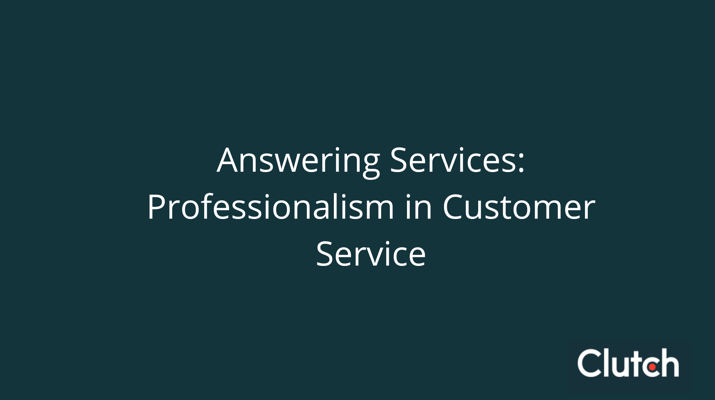

Updated February 23, 2026
Offloading customer-facing work to call center professionals with a wealth of customer service work experience had its benefits. Partnering with a call center can help your business quickly address customer concerns while improving the quality of the overall customer service experience.
It’s no secret that customer service is a massive differentiator for consumers when making purchasing decisions.
With customer service having such a tangible effect on sales, smart business owners should be looking to boost their customer service capabilities whenever possible. A great way to do so is to bring in an external call center to support customer service operations, particularly for small business owners.
This article will outline what a call center is, how a call center can help your business, and what steps you and your team should take when looking to contract support from a call center.
Looking for a Call Centers agency?
Compare our list of top Call Centers companies near you
Looking to hire a call center? Clutch does all the hard work for you— check out reviews and company info from the top-rated call centers.
Before discussing how to onboard your call center support, we first need to establish what a call center is.
A call center is a business entity where employees field a high volume of calls or make direct contact with customers via other communication channels.
Call center agents, who may work from home or in a physical office building as part-time or full-time employees, will typically report to a call center manager. This manager ensures that the team meets key metrics and that customer satisfaction is high.

There are two main types of call centers: inbound and outbound.
Companies typically outsource call center support, but that doesn’t necessarily mean that the support comes from outside the United States. 102 American call centers were opened or expanded in 2021, representing over twice as many as that of the second-highest region.
While many industries turn to call centers to help expand the workload of their customer service teams, companies in some industries get more use out of them than others. The top five industries working with call centers in 2021 were:
Call centers can boost your business's customer service capabilities by providing an experienced team of call center representatives whose communication skills will help provide customer support and interaction in inbound and outbound settings.
As their name might suggest, call centers primarily handle incoming calls from or outgoing calls to a client’s existing or prospective customer base. However, as alternative modes of B2B and B2C contact have grown increasingly popular in recent years, so too have the capabilities of call centers.

In addition to phone calls, many call centers handle customer contact via more modern communication methods such as SMS messages or social media posts. To reflect this broader scope of responsibilities, these businesses are now sometimes referred to as contact centers.
Regardless of your call center's communication channels, they will also be responsible for any necessary data entry and appointment setting related to their customer contacts. This organizational work will ensure that your internal team has everything they need for any essential customer follow-up.
Call center agents play a front-facing role for the businesses they represent. By gathering necessary information over the phone, they can address concerns or connect customers with the correct parties for further communication.
Bringing in a highly-qualified call center to support your customer service operations can help you guarantee that customer satisfaction results from every interaction.
To this end, having live call center agents ready to field customer calls can be a huge differentiator. Recent Clutch data indicates that 88% of people prefer speaking to a human customer service representative over navigating an automated menu when they call a customer service line.
When contracting external vendors, the impact on your company’s expenditures is often among the most pressing concerns. With the myriad of call center options available internationally, you and your team should be able to find a customer service partner that fits whatever budget you set.
Moreover, regardless of the location in which the call center you contract is based, your business won’t have to directly pay for healthcare and other benefits as you would with in-house new hires.
Depending on the location of your contracted call center, an added benefit of their support may be increased customer service availability.
For instance, the Philippines is one of the most prominent locations for call centers internationally. The country’s single time zone is 12 to 13 hours ahead of that of the east coast of the United States.
Say you’re a US-based business that wants to offer 24-hour customer service. By contracting a nearshore call center for 12 hours of the day and a Filipino call center for another 12 hours, you can provide full availability without working outside either location’s regular business hours.
Now that we’ve reviewed the functions and benefits a call center can bring to your business, you may be wondering what you should do when you’re ready to onboard a team of call center agents.
Here are 4 steps for you and your team to follow to help you pick the best possible call center service provider:
Read on for a description of what each step should mean for you and your business.
When first looking to hire an external vendor for any function, creating a requirements list is an excellent first step to ensure clarity from the earliest days of your selection process.
Given the variety of responsibilities with which you could charge a call center, maintaining this clarity from early on is of the utmost importance.
Your requirements can be as broad or specific as you need to fully outline the scope of work you want the call center to cover.
To help you and your team build a requirements list to guide your search, you’ll want to ask yourself questions such as the following:
You’ll want to build a requirements list for the call center provider as a collaborative brainstorming effort with your internal customer service team.
In doing so, you’ll be able to workshop your requirements in real-time and ensure your team is in lock-step with expectations for the call center you eventually hire.
With a requirements list created via a collective decision-making process, your next step in hiring a call center is to reach out to prospective service providers so you can gather information about them and determine if they are a good fit for your business.
You may want to consider reaching out to business process outsourcing (BPO) firms, in addition to contacting centers when conducting your search.
A BPO company administers and manages business processes for clients based on predefined and measurable performance metrics.
With the idea of enhancing your customer service capabilities in mind, bringing in a BPO firm rather than just a call center may help your business deliver customer satisfaction even more.
Regardless of the types of call-center-competent firms you contact, you’ll want the conversation with each business to be guided by your requirements list.
Be sure to ask them specific, direct questions so that you can come away from the conversation with answers that allow you to assess the degree to which they meet each requirement.
In addition to gauging each company's abilities, you and your team should also make sure your introductory meeting with pricing information.
Once you’ve had conversations with each vendor and gathered all information necessary to evaluate them, it’s time to consider all this information together and decide which firm to hire.
This decision should be guided by your requirements list and the information you compiled in your conversations with each vendor.
One of the factors that should be most influential in your decision is pricing for each vendor. You’ll want to consider the hourly rate you’ll pay with each call center service provider and the level of staffing you’ll receive for your payment to determine which vendor delivers the best value for money.
Of course, you’ll also need to consider the tradeoff between pricing and service capabilities. The cheaper vendors may not meet all of the qualifications listed in your requirements.
Your final decision should balance getting the best possible price for call center services with having as many of your needs met by your vendor as possible.
To this end, grouping each point on your requirements list into prioritization categories such as “necessary,” “useful,” and “nice to have” may be helpful.
Your decision-making process on your call center service provider shouldn’t end when you’ve signed a contract with a vendor.
Instead, you’ll want to track performance metrics throughout the engagement to determine if your call center is effectively meeting your needs.
Here’s a list of metrics you may want to track:
Any number of these metrics could be helpful for shedding light on the performance of your call center service provider, depending on the goals and terms of your engagement.
You’ll want to compile, visualize, and analyze data regularly for whichever metrics you choose to use for your evaluation. You should share any alarming findings with the call center to improve the service they provide to you in the future.
Companies look for any way to improve their customer service experience in today’s hyper-competitive landscape.
Bringing in an external call center to help your business handle inbound or outbound calls can be a huge difference-maker for your business.
If you and your team decide to hire a call center, be sure to prioritize these tasks:
By offloading this front-facing role to seasoned professionals, you can free up your internal customer service team while ensuring that all direct contact with your customers is still handled with care.
Connect with call centers that can take work off your plate on Clutch.co.
Additional Reading:


